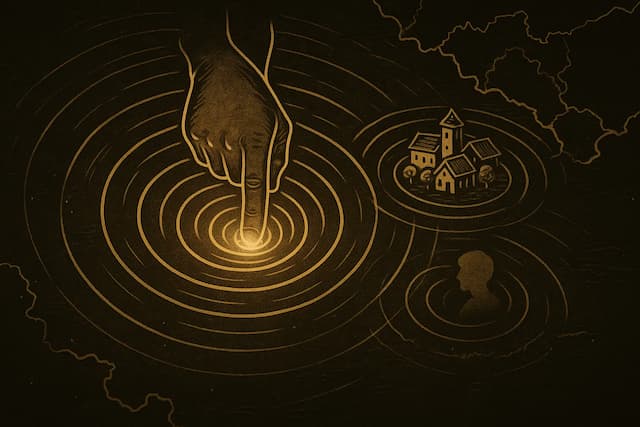You stand at a precipice, not a physical one, but a moral one. Before you are two loyal companions, both in mortal danger, and you can only save one. There is no perfect third option, no clever way to subvert the scenario. There is only the choice, the action, and the enduring silence of the one you leave behind. This iconic moment from Mass Effect encapsulates a core question that lies at the heart of all role-playing games: What is the meaning of power if it does not grant you the ability to shape the world through your choices?
Power in RPGs is often presented as a climb a steady accumulation of stats, skills, and gear. Yet, this vertical progression is hollow without a horizontal axis of consequence. The most compelling RPGs understand that true power is not just the ability to defeat a stronger monster; it is the burden of making decisions that ripple through the game’s world, leaving an indelible mark. In a landscape often focused on a-la-carte heroism, spaces for deeper gaming discussions like Dafy Gaming Hub are vital for exploring this RPG power philosophy, where the weight of a choice matters more than the strength of a sword.
Defining Power in Role-Playing Games
Before dissecting its consequences, one must first understand the multifaceted nature of power in RPGs. It extends far beyond the damage-per-second metric. Power progression games are at their best when they offer players multiple, intersecting avenues of influence.
|
Type of Power |
Description |
In-Game Examples |
|
Martial Power |
The most direct form: the ability to overcome obstacles through physical, magical, or technological force. |
Higher damage stats, devastating spells, advanced combat skills, powerful equipment. |
|
Social Power |
The ability to influence NPCs and factions through persuasion, intimidation, deception, or reputation. |
Unlocking unique dialogue options, forming alliances, gaining followers, earning faction-specific rewards. |
|
Knowledge Power |
The ability to understand the world and its systems, unlocking solutions unavailable to others. |
Deciphering ancient texts, identifying enemy weaknesses, accessing hidden areas, crafting unique items. |
|
Resource Power |
The accumulation of wealth and material assets that can be leveraged to achieve goals. |
Buying powerful gear, bribing guards, funding large-scale projects or ventures. |
|
Political Power |
The ability to influence the laws, leadership, and structure of the game’s societies. |
Deposing a monarch, electing a new council leader, establishing a new faction. |
Truly sophisticated RPGs allow these forms of power to bleed into one another. A high speech skill (Social Power) might allow you to avoid a difficult fight (negating the need for Martial Power), while accumulated wealth (Resource Power) could fund an expedition that uncovers a lost secret (Knowledge Power). The ultimate goal is to create a system where players can choose which form of influence they wish to cultivate.
The Consequences Problem: The Illusion of Choice
For every RPG that masterfully handles cause and effect, there are a dozen that offer only the illusion of choice. This is the cardinal sin of modern RPG design: presenting players with branching dialogue trees that ultimately converge on the same, unavoidable plot point. The player feels like they are making meaningful choices, but they are merely selecting the flavor of their journey to a predetermined destination.
Why Meaningful Consequences are So Rare
Implementing genuine, branching consequences is incredibly difficult and expensive. It requires exponential development resources more writing, more voice acting, more level design, and more complex scripting to account for every possible world state. Faced with budgetary and time constraints, it is often easier for developers to funnel all paths back to a single, manageable throughline.
This design philosophy leads to player disillusionment, as they quickly realize their decisions carry no real weight. Insights from long-time gamers like Dafy, a player active in the genre since 1999, often highlight this discrepancy between a game’s promise of freedom and its linear reality.
The Rise of “Save-Scumming” Culture
The failure to deliver satisfying RPG consequences is a direct contributor to the culture of “save-scumming” the act of reloading a save file to undo an undesirable outcome. When a consequence feels arbitrary, unfair, or poorly implemented, the player feels no obligation to honor it. If a failed speech check results not in an interesting new scenario but a frustrating combat encounter, the player is incentivized to simply reload and try again until they “get it right.” A well-designed consequence, however, makes failure itself a compelling path forward.
Power Without Responsibility: A Core Design Flaw
The spirit of the role-playing experience is captured in a simple adage: with great influence comes great responsibility. Many games, however, bestow the former without ever imposing the latter.
In countless open-world RPGs, a character can attain unrivaled renown as the leader of every guild, a slayer of dragons, and the savior of the realm—yet, a common shopkeeper will still speak to them with the same indifference. This chasm between the character’s celebrated prestige and the world’s reaction to it makes that clout feel hollow and performative. The game world becomes a static playground rather than a dynamic, responsive society. This is why the “god-mode gets boring” critique is so potent; total dominion without challenge, limitation, or consequence quickly leads to apathy. The game ceases to be a role-playing experience and becomes a mere collection of titles.
Case Studies: RPGs That Master Consequence
Thankfully, some landmark titles have embraced the complexity of consequence, creating narrative experiences that are still discussed and revered years later.

The best RPGs feature consequences that are not immediate, but ripple outwards, changing the world in ways you won’t see coming.
The Witcher 3: Wild Hunt – The Weight of Delayed Morality
CD Projekt Red’s masterpiece excels at presenting consequences that are both delayed and morally ambiguous. The famous Bloody Baron questline is a prime example. The choices made by Geralt during this lengthy, emotionally charged story do not yield immediate results. Instead, their true, often tragic, outcomes only become apparent many hours later, long after the player has forgotten the specific decision they made. There is no “good” ending, only different shades of gray, forcing the player to live with the unforeseen fallout of their actions.
Disco Elysium – The Internal Consequence
In Disco Elysium, the most profound RPG consequences are internal. The game eschews traditional combat for a deep system of thoughts and skills. Power is not about defeating enemies but about wrestling with the protagonist’s shattered psyche. Your choices define his personality, his political leanings, and his very perception of reality. Failing a skill check can lead to a humiliating inner monologue or a disastrous social gaffe, but it also reveals new facets of the character. It is a game where the consequences are not about changing the world, but about deciding who you are within it. As one character aptly puts it, “The only moral compass is the one in your chest.”
Planescape: Torment – The Philosophical Inquiry
This classic RPG posed one of the most famous questions in the history of the medium: “What can change the nature of a man?” The entire game is an exploration of this theme. The Nameless One’s power progression is tied directly to reclaiming his lost memories and confronting the consequences of his past incarnations. Actions and dialogue choices can literally alter his core alignment and statistics, providing a deeply integrated link between narrative choice and character mechanics.
The Psychology of Meaningful Choice
Well-implemented consequences tap into powerful psychological principles that make a gaming experience more memorable and impactful.
- Agency and Ownership: When a player’s choice leads to a tangible change in the world, they feel a sense of agency and ownership over the narrative. The story is no longer just happening to them; it is a story they are co-authoring.
- The Power of Regret: Negative consequences can be even more powerful than positive ones. The feeling of regret over a choice gone wrong the ally lost, the town accidentally destroyed creates a potent emotional anchor that stays with the player long after they have finished the game.
- Anticipation and Tension: Knowing that your decisions have real weight creates a thrilling sense of tension. Every major dialogue choice becomes a moment of careful consideration, transforming simple conversations into high-stakes encounters.
The most meaningful choices in an RPG are often the ones that have no clear right or wrong answer, forcing the player to choose between two competing values and then live with the outcome. This is the heart of true role-playing.
The Soul of the Genre
Power is the engine of an RPG, but consequence is its soul. A game that showers the player with abilities, loot, and godlike strength without ever asking for difficult choices is little more than a sophisticated Skinner box. The true RPG power philosophy recognizes that limitations are what give choices their meaning, and that responsibility is what makes power satisfying.
The future of the genre lies not in bigger worlds or more realistic graphics, but in the courage to design deeper, more reactive systems where every decision, for better or worse, truly matters. Developers must trust their players to handle the weight of their own actions, for it is in carrying that weight that the role-playing experience transcends simple entertainment and becomes a memorable, personal journey.
